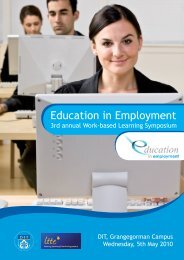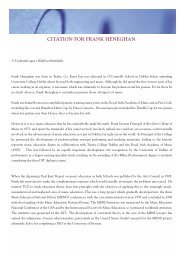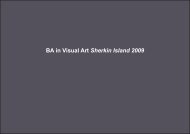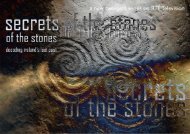TWICE THE SIZE - DIT Update - Dublin Institute of Technology
TWICE THE SIZE - DIT Update - Dublin Institute of Technology
TWICE THE SIZE - DIT Update - Dublin Institute of Technology
Create successful ePaper yourself
Turn your PDF publications into a flip-book with our unique Google optimized e-Paper software.
FUTURE SCENARIOS FOR CORK<br />
SCENARIO 1: Pandora’s Box (National scenario: <strong>THE</strong> SOW OF LIBERTY)<br />
Interview with Former Mayor <strong>of</strong> Cork (2017-2022), Mr Sean O’Sullivan, for CORCAIGH<br />
CEARTLÍNE, the first Cork video-zine.<br />
By Martha KURSKA<br />
Martha Kurska (MK): Mr O’Sullivan, you were Mayor <strong>of</strong> Cork City between 2017 and 2022. It<br />
would be a common view that many <strong>of</strong> the decisions you and your predecessor, Mr John Murray 8 ,<br />
took while in <strong>of</strong>fice have led Cork to be what it is today. In your view, what does Cork stand for<br />
in 2030?<br />
Sean O’Sullivan (SOS): Well, that’s an interesting question. I would describe the city by three<br />
words: ‘bi-‘, ‘opportunism’ and ‘water’.<br />
MK: That’s an intriguing answer?! What is ‘bi-‘?<br />
SOS: Let me explain. Bi- represents dualism, both in a positive and negative sense. Let’s look at<br />
our economy. The two main sectors are: first, biotechnology, including medical industry, the<br />
food and drink industries; and second, broadly speaking the whole heritage industry. These two<br />
sectors are fundamentally different; one is perceived as modern, cutting edge, while the other<br />
builds upon values and traditions <strong>of</strong> the past and responds to the needs <strong>of</strong> identity and<br />
belonging. Yet, both seem to complement each other very well, as they represent 64% <strong>of</strong> Cork’s<br />
revenue!!<br />
MK: Yes, they may be different, but both operate on the same principles <strong>of</strong> market economics,<br />
and their main aim is to make money, so are they really ‘bi-‘?<br />
SOS: Well, it is necessary to operate according to the principles <strong>of</strong> current market economics to<br />
be successful in this highly globalised, competitive and connected world. However, the real<br />
challenge is to be able to create new sectors <strong>of</strong> the economy within that framework, to spot and<br />
use the opportunities that open up. I think Cork has been quite successful at that, hence the<br />
opportunism. For example, the results <strong>of</strong> the research exercise conducted by ESRI in 2014<br />
indicated that Ireland has rapidly been loosing its traditional values, culture and traditions as a<br />
result <strong>of</strong> globalisation. This had strong implications for the tourism industry – the more<br />
globalised the world became the more people were searching for national distinctiveness and<br />
different cultural experiences. In 2015, seizing the opportunity to build upon Cork’s culture and<br />
traditions, the Cork Metropolitan Authority teamed up with a group <strong>of</strong> investors to develop a<br />
‘cohesive heritage’ industry for the city. One <strong>of</strong> the first steps was the building <strong>of</strong> the ‘Famine<br />
Centre’ – a very successful multi-media modern museum. An extensive international marketing<br />
8<br />
John Murray became the first Mayor <strong>of</strong> Cork, after the positions <strong>of</strong> directly elected Mayors were introduced in late<br />
2011.<br />
151








